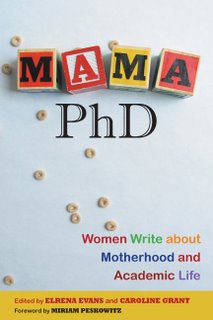Engineering Motherhood
October 4th, 2009Jennifer Eyre White was another writer on our wish list. Elrena and I both loved her very funny Literary Mama column, Degrees of Freedom, and I had been lucky enough to meet her a few times and exchange work with her in a small writing group. But we had to talk her into contributing, not because she was so busy (though she was) or because we couldn’t pay much for her contribution (though we couldn’t) but because she wasn’t sure her contribution would fit the book. Jennifer was a “non-traditional student,”a woman who tried five different high schools before finally dropping out at seventeen; “I spent most of my time,” she writes, “working for an ice-cream store, drinking beer, wearing trampy clothes, and making bad dating choices.”
But after a couple years of fairly mindless dead-end work, she decided she needed a change:
“It was then that I decided to become an electrical engineer, convinced it would be my ticket out of intellectual petrifaction. Choosing electrical engineering wasn’t a well-informed decision; in spite of having an engineer dad, I’d never actually figured out what engineers did. My dad didn’t talk about his job, and my own observation was that mostly what he did was tinker on his Corvettes. … I assumed that if I got an engineering degree, I too would learn the secrets of working on cars. I now know that this particular goal would have been better served by an auto-shop class.”
The goal might not have been expertly considered, but the journey certainly was, and Jennifer’s essay describes her careful route, via community college (where she met her husband), then a junior transfer to UCLA for her degree in electrical engineering, then a spreadsheet-organized plan to be a grad student mom:
“As I’d hoped, being a mother and a graduate student turned out to be a great combination. I had plenty of time with Riley, and enough time away. I did brain things, and I did mom things. If she was sick and I needed to be home with her, no one cared that I didn’t show up for class; I never had to call in sick or apologize for missing a big meeting. I didn’t have to hoard my vacation and sick days like a candy bar on a desert island. I didn’t have to worry whether my co-workers (or my boss) thought I was a flake. Later on, when I tried juggling an engineering career with one, then two, then three kids, I realized just how much harder it was to be a working mom than to be a student mom.”
Today, Jennifer writes, “Your email. . . made me want to tell you how writing my Mama PhD essay has affected me. As you know I was a fighter plane and sports car groupie long before I became an engineer, and if I’d had a clue what I was doing I should have chosen to become a mechanical engineer rather than an electrical engineer (EE’s don’t take classes in stuff like aerodynamics since we’re too busy studying circuits and semiconductor physics and that sort of thing).
“Writing my essay for Mama PhD reminded me of my original love of overpowered machinery and it made me sad that I never learned about the stuff that interested me — so I recently registered for an online class in airfoil design. I’m happy to report that, unlike when I was in grad school in the mid 90’s, lots of excellent engineering schools have online grad-level courses now. This is great for people who work and also, of course, for moms!
“The only question is whether I can remember the prerequisite material fast enough to keep up. It’s slightly terrifying. Oh, and writing the essay also made me really want to go back to driving a ferocious sports car rather than a minivan. Still working on that one.
Some time later, Jennifer sent me another update, demonstrating how flexible working student moms need to be: “I switched classes from Airfoil Theory to Dynamics because of a work conflict (well, not only did I switch classes, I switched colleges, since I needed a later start date). I’m really excited. But I know I will be severely overwhelmed.”
Jennifer is one of several contributors to the book who do not hold PhDs — some of them are still working on the degree; some are deciding whether to finish it; some, like Jennifer, never wanted that particular degree, or needed it to pursue a career in their chosen field. But all their stories shed light on the challenges of combining motherhood and academic work, and we’re happy Jennifer’s story is in the book. And now we’ll look forward to seeing her airplane designs.


 Join us on Facebook
Join us on Facebook